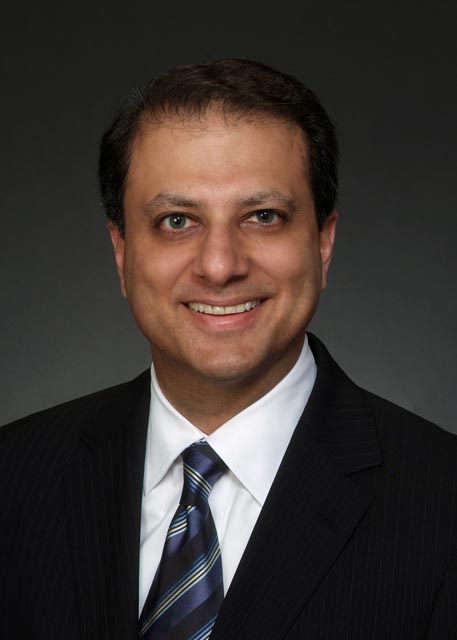
He’s been mocked as Uncle Tom on Twitter, asked if he uses Fair and Lovely and accused of being more white than the whites. This for someone who was earlier lauded as being the Sheriff of Wall Street and appropriated by Indians as their own Blue-Eyed Boy.
In the escalating drama of the Deyvani Khorbagade case, one figure who has gone from great acclaim in India to great notoriety is Preet Bharara, US Attorney for the Southern District of New York. So the question arises: Did Preet Bharara Go Too far?
Here is Preet Bharara’s statement.
The Line That Was Crossed
“Bharara is absolutely right in making an issue of the way diplomats are abusing labor laws and the way Indians abuse their servants,” says Vivek Wadhwa, well-known academic and Fellow at Stanford University. “From that point, he’s got the high ground. Here’s the problem – to have picked on a mother, a diplomat, to have done it the way it was done is outrageous.”
“Arresting a woman who has done something commonly done by many diplomatic missions, singling her out like this and taking her to jail where her human rights were abused is unacceptable. There was no cause to strip-search her. The principle of what they did may have been right, but they lost it the moment they put her in jail.”
Wadhwa feels this case sets a bad precedent for other nations, especially rogue nations who can then jail American diplomats who don’t adhere to local laws. “This was the line that was crossed,” says Wadhwa. “The problem is Preet Bharara should not have stepped onto State Department turf and arrested a diplomat. They should have expelled her as a diplomat – that was the right protocol. Someone has to apologize – not for prosecuting her, but for strip searching her and putting her in jail.”
Yet Another View on The Khobragade case
“One Nation’s Law Can Do Violence to Another Nation’s Law”
Ravi Batra, a noted lawyer in New York, also observes that the rule of law is very important and it needs to be followed. ” However in the comity of nations when you have sovereign nations coexisting in peace, one nation’s law can do violence to another nation’s law. It has to be recognized that American rule of law exists only within the US territory and other sovereign nations have the same right to assert their rule of law within their territory.”
He adds that there are many nuances to how a foreign domestic worker is paid, since this includes lodging and boarding and healthcare, which are not included in the US minimum wage. Batra had earlier handled former consul general Prabhu Dayal’s case successfully against his foreign domestic worker who claimed sexual harassment and said she had to sleep in a closet when she actually had a studio apartment. The lawyers from the Legal Aid Society withdrew these two charges because they were proved to be fraudulent.
“Human trafficking is a modern day slavery and a sin that affects and should affect every human being with great sadness and anger,” says Batra. “Humans trafficked today come in cargo ship containers without even daylight, and many don’t survive – those cargo containers have become modern day slave ships. That’s what a T-visa is for.”
He asks, should this T-Visa apply to someone who comes voluntarily as a foreign domestic worker, free to move about, live in the best accommodations, particularly in Manhattan?
” I’m not sure that’s human trafficking – I think the jury is out on that one,” he says. “The T-Visa is an overwhelming motive for foreign diplomatic domestic workers to lie so as to get a green card while they are here. It’s the kind of incentive to do violence to the adversarial system of justice which we all rely upon to get the truth out.”
As the blame game is played out here, Batra says there’s a need to do housecleaning and honor international obligations because one country’s rights begin where another’s end. He suggests that the charges be resolved amicably with a Chai Summit, like Obama’s famous Beer Summit, to restore friendship: “The 1773 Boston Tea Party, with Indian tea, gave birth to the American Revolution – let Indian Tea reunite the two law-abiding nations in 2013.”
This article first appeared in Daily Mail
Related Article
Deyani Khobragade, A Missing Maid, An international Incident

1 Comment
Why do Indian diplomats bring servants/maids/housekeepers? When we come into this country to stay for a short/long period or forever depending on your visa status, we embrace the dishwasher, oven, microwave, and the washer dryer gleefully. Chores are made much simpler and all that wonderful privacy. Who needs a servant?
Of course one must condemn the arrest and the nightmarish examination.The case could have been much simpler..I reiterate if the diplomat had been sent back to India